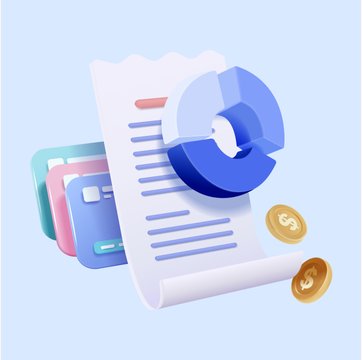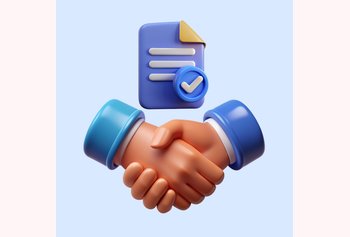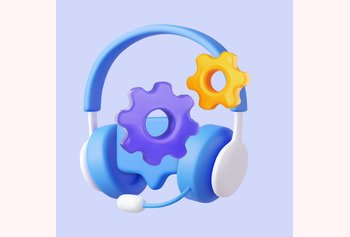6 Best Accounts Payable Software for Small Businesses in 2025

Table of contents
Tracking your finances when you’re running a small business can be a task. A small error or delay in the entries can directly impact your day-to-day budget and cash flow. This is why keeping finance logs error-free, secure, and up-to-date is crucial, especially for small businesses.
Finance automation tools help businesses do exactly that. With accounts payable software small businesses can make timely payments, foster vendor relationships, and maintain clear financial records.
In this article, we will specifically take a look at what an accounts payable software is, how it can benefit your small business, and the best options in the market to consider in 2025.
Table of Contents
- What is an Accounts Payable Software?
- Why Do Small Businesses Need an Accounts Payable Tool?
- 6 Best Tools For Automating Your Accounts Payable Process in 2025
- Benefits of Using an Accounts Payable Software
- How to choose the right accounts payable software for your small business in 2025?
What is an Accounts Payable Software?
Accounts payable software is a tool that helps handle and automate a business’ accounts payable processes. What does this exactly mean? An accounts payable software helps in streamlining invoices, managing vendor payments, and maintaining accurate financial records.
Some common features of an accounts payable solution include:
- Invoice management
- Payment processing
- Approval workflows
- Vendor management
- Reporting and analytics
Why Do Small Businesses Need an Accounts Payable Tool?
Consider this scenario:
Say, there’s a small manufacturing business that relies on various vendors for raw materials. Without an accounts payable software, it becomes difficult to manually keep track of vendor payments, communications, and invoices. Delays in payments, missed deadlines, and occasional errors are inevitable at some point.
It can lead to the entire workflow coming to a halt—be it under-stocked inventory or no delivery of the manufactured goods since the payments were delayed.
However, with accounts payable software, all your payments are automated and streamlined, leaving no room for errors or delays.
6 Best Tools For Automating Your Accounts Payable Process in 2025
If you’re looking for an accounts payable software, check out these six options for your small business, along with their key features and pricing plans.
1. Hiver
First on the list is Hiver. If you are looking to streamline your accounts payable with a tool with a neat, intuitive UI, look no further. What’s even better is that you can get started with the tool in just three hours.
Hiver sits on top of Gmail and Outlook—which makes it super easy to set up and start using the tool. In addition to this, it provides a ton of features for finance teams of small businesses to work more efficien
- Streamline accounts payable: With Hiver, you can automate your accounts payable and receivables with a single solution. You can also direct invoices to the right members of your team and ensure seamless and timely transactions.
- Manage approval requests more efficiently: A lot of times, finance teams need to set up multi-step approval workflows across various departments. With Hiver, can initiate, track, and get approvals for invoices, discounts, reimbursements, and other requests right from your Gmail or Outlook account account.
- Improve cross-team collaboration: Cross-collaboration is an important aspect to consider for small businesses where a small group of people wears multiple hats. With Hiver, you can track, route, and collaborate on invoices and vendor queries in just a few clicks. Admins get a bird’s eye view of all activities in real-time.
Finally, you also get integrations with third-party tools, automation of operational workflows, and email management functionalities without having to learn how to work with a new software—which is great for small businesses working on a tight budget.
Key features:
- Automated multi-step approval workflows
- Both accounts receivable and payable management
- Cross-collaboration with various departments
- Operational work automation
Pricing:
Hiver has four pricing plans, which includes a free plan. It also offers a free trial of 7 days.
- Free Plan
- Lite: $19/user/month
- Pro: $49/user/month
- Elite: $79/user/month
2. QuickBooks Online
Next on the list is QuickBooks Online. It is a popular cloud-based accounting solution for small businesses. QuickBooks includes an extensive accounts payable module that helps automate invoice entry, bill payment, and reconciliation operations.
It also truly simplifies and improves the efficiency of handling accounts payable with features such as automated data entry, customizable payment schedules, and seamless interaction with bank accounts.
QuickBooks Online is a great pick for small businesses because of its comprehensive accounts payable capabilities and free guided setup to connect your bank accounts and automate your most frequently performed tasks. It also offers a 30-day free trial.
Key features:
- Automated bill payment and invoice entry
- Highly customizable payment reminders and schedules
- Bank integrations for a seamless payment experience
Pros:
- Popular with accountants, easy to use, and accessible remotely.
- Live banking transactions feed and document attachment.
- Good banking integration and customizable invoices.
Cons:
- Expensive, limited support, and a steep learning curve.
- Users have reported arbitrary creation of General Ledger accounts.
- Cluttered interface with advertising and unhelpful changes in terminology, which makes navigation confusing for some users.
- It is difficult to correct input errors like bank reconciliation dates.
Pricing:
QuickBooks Online offers four pricing plans:
Simple Start: $15/month
Essentials: $27.50/month
Plus: $42.50/month
Advanced: $100/month
3. Wave
Wave is yet another easy-to-use accounting software designed for small businesses. It also offers free invoicing and accounting modules, which makes it a great choice for small businesses that are working with tight budgets, but still want to manage their finances better.
Its accounts payable module automates and simplifies invoice and bill payment processes, ensuring accurate payables management. Wave also allows you to synchronize your bank accounts for quick reconciliation, spending monitoring, and categorization.
Wave’s user-friendly interface and low-cost pricing make it a dependable solution for small businesses.
Key features:
- Expense segmentation and tracking
- Bank account synchronization
- Automated invoice and payment processing
Pros:
- Free to use with affordable add-ons.
- Tracks and automates payments to vendors, with features like payment scheduling and direct ACH bill payment.
- Helps manage invoices and collections effectively with features such as auto billing and payment reminders.
- Provides a complete picture of a company’s cash flows, including cash forecasting.
- Offers bank reconciliation and integrates with finance apps for accurate record-keeping.
Cons:
- It is not scalable for growing businesses and lacks advanced features such as inventory management, billable expenses, project profitability tools, etc.
- Limited customer service unless you subscribe to paid products.
- Accounts payable features are not as powerful as those of QuickBooks or Xero; they lack the ability to set recurring bills or create purchase orders.
Pricing:
Along with its free invoicing and accounting modules, Wave offers paid modules:
Mobile receipt feature (to scan receipts on-the-go): $8/month for monthly subscription; $6/month for annual subscription
Payroll module: $40/month for tax service states; $20/month for self-service states
Bookkeeping support: $149/month
4. Kashoo
Kashoo is an accounting software designed to help teams handle finance operations more seamlessly. Its accounts payable module handles invoice entry, payment processing, and expense tracking automatically. Kashoo’s standout feature is that it supports a range of currencies and calculates conversion rates to facilitate seamless international transactions.
Kashoo also includes receipt attachment and bank reconciliation features, allowing small businesses to handle their accounts payable while keeping accurate financial records—which is certainly a priority for any business.
Key features:
- Conversion rate calculation and multi-currency support
- Automated bill payments and invoice entries
- Receipt attachment for enhanced expense tracking
Pros:
- Kashoo offers a free invoicing plan that allows an unlimited number of users.
- The interface is simple and beginner-friendly, with no confusing jargon.
- The software automates many tasks, like categorizing bank transactions and populating reports and tax documents.
Cons:
- Kashoo lacks a time-tracking feature and doesn’t work on Android devices.
- Its paid plans are more expensive than some competitors and lack advanced features, which might not suit businesses with complex needs.
- Functions such as receiving payments depend on third-party services, which could complicate the payment process.
Pricing:
Kashoo offers two pricing plans:
TrulySmall Accounting (for small businesses): $216/year
Kashoo (for established businesses): $324/year
5. BILL
A small business favorite, BILL is a cloud-based tool for automating accounts payable operations. It helps finance teams streamline invoice processing, approvals, and electronic payments to ensure crystal-clear financial records.
Cheque printing, multi-user collaboration, and role-based access are some of the stand-out features BILL offers. The platform enables small businesses to cut down on manual work with its end-to-end automation functionalities, improving the overall efficiency of financial operations.
Key features:
- Multi-user collaboration and role assignment
- E-payments and cheque printing
- Automated bill payments and digital approvals
Pros:
- Automates invoice information processing for quicker operations.
- Includes a “to-do list” feature for task prioritization.
- Provides useful reports for audit preparation.
- E-payments are easy to use and well-integrated with QuickBooks.
- Simplifies the expense approval process.
- Generally considered easy to use, affordable, and flexible.
Cons:
- Bulk reassignment of invoice approvers is not available.
- Users have reported sync errors.
- Cannot send checks to international vendors.
- Difficulty in changing email addresses, deleting bank accounts, and editing accounts.
- Payees are required to create an account, and there are unclear instructions for payment acceptance.
Pricing:
BILL offers the following pricing plans:
For accounts payable
Essentials: $45/user/month
Team: $55/user/month
For accounts receivable
Essentials: $45/user/month
Team: $55/user/month
For both accounts payable and receivable
Corporate: $79/user/month
Enterprise: Custom pricing (need to request a demo to know the pricing)
6. Xero
Last on the list but a great pick for small businesses is Xero. It is a cloud-based accounting software that is well-known for its user-friendly design and powerful accounts payable capabilities.
Xero’s accounts payable module is designed exclusively for small businesses and automates bill entry, payment processing, and tracking—empowering them to manage their finance operations easily and efficiently.
Xero offers a range of useful features, such as multi-currency support for foreign transactions, purchase order production, and real-time visibility into cash flow, allowing businesses to handle payables with much more ease.
Key features:
- Order creation and tracking for purchases
- Multi-currency support for foreign transactions
- Automated bill creation and vendor payments
Pros:
- Saves on infrastructure costs by being cloud-based, reducing the need for on-site servers and IT maintenance.
- The cloud-based nature also allows business owners to work remotely, process payroll, and pay bills from anywhere.
Cons:
- The entry-level plan has limitations on invoices and bills; advanced features are only available in the most expensive plan.
- One organization per subscription: this may not be cost-effective for bookkeepers or owners of multiple businesses.
- Telephone support is limited, potentially leading to delays in resolving issues.
- There might be a learning curve involved while setting up the platform.
- Limited customization for reports and templates, with occasional software glitches and technical issues.
Pricing:
Xero offers three pricing plans:
Starter: $25/month
Standard: $40/month
Premium: $54/month
Benefits of Using an Accounts Payable Software
An accounts payable solution can help your business with a number of things, including:
- Processing invoices efficiently: An accounts payable solution can completely automate your invoice processing workflow, leaving no room for errors or delays. This enables you to review, receive, and process payments faster and more efficiently.
- Streamlining approval workflows: Accounts payable software can help you establish predefined approval workflows for invoices, meaning that you can ensure proper authorization and review your vendors from time to time to optimize costs.
- Maintaining accurate financial records: Having and maintaining reliable financial records is extremely important for a small business. With an accounts payable tool, you can eliminate the need for manual maintenance, minimizing errors in data entry and calculations.
- Improve vendor relationships: Accounts payable software can help small businesses store vendor information, manage historical payments, and review payment terms. This, in turn, helps you identify your spending patterns, track invoices, and even negotiate better with vendors in the long term. Additionally, with no delays in payment, you can build strong relationships with your vendors and streamline your procurement process.
- Meet your audit and compliance requirements: Small businesses are subjected to a range of regulations and compliance requirements. With an accounts payable software, keeping track of your finances, handling invoices, and maintaining a clear audit trail becomes much easier and more precise.
How to choose the right accounts payable software for your small business in 2025?
With so many platforms in the market, making the right choice can be a bit tricky. Before you pick an accounts payable software for your team, make sure you evaluate your specific needs internally and ensure that the tool meets them.
Factors such as scalability, ease of use, customer service, and integration capabilities are also crucial in the long run—so that you and your team don’t have to think about switching tools after a while.
If you’re looking for an accounts payable software that offers value for money and checks all the boxes above, take Hiver for a spin. You can get started in a jiffy and manage your finances seamlessly—right from your Gmail or Outlook account.

































